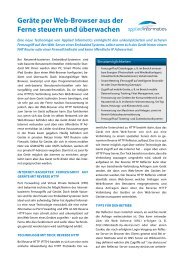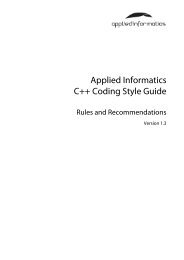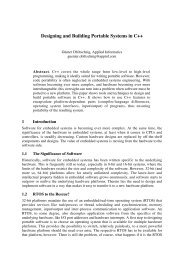C++ in Safety-Critical Systems - Applied Informatics
C++ in Safety-Critical Systems - Applied Informatics
C++ in Safety-Critical Systems - Applied Informatics
You also want an ePaper? Increase the reach of your titles
YUMPU automatically turns print PDFs into web optimized ePapers that Google loves.
<strong>C++</strong> for<br />
<strong>Safety</strong>-<strong>Critical</strong> <strong>Systems</strong><br />
DI Günter Obiltschnig<br />
<strong>Applied</strong> <strong>Informatics</strong> Software Eng<strong>in</strong>eer<strong>in</strong>g GmbH<br />
guenter.obiltschnig@app<strong>in</strong>f.com
A life-critical system or safety-critical system is a system<br />
whose failure or malfunction may result <strong>in</strong>:<br />
> death or serious <strong>in</strong>jury to people, or<br />
> loss or severe damage to equipment or<br />
> environmental harm.<br />
Wikipedia
Is <strong>C++</strong> the "right"<br />
programm<strong>in</strong>g language<br />
for safety-critical software?
Before answer<strong>in</strong>g this, we<br />
may first want to ask:
Is C the "right"<br />
programm<strong>in</strong>g language<br />
for safety-critical software?
NO!
C puts all responsibility on the programmer.<br />
> C makes it too easy to make mistakes.<br />
> C has a weak type system.<br />
> C has no automatic runtime checks.<br />
> C is <strong>in</strong>sufficiently specified.
So why do we keep us<strong>in</strong>g<br />
C for safety-critical<br />
software?
C is available everywhere.<br />
> C programmers are easy to f<strong>in</strong>d.<br />
> C is efficient (execution speed, code size).<br />
> C gives direct access to the bare metal.<br />
> C is open and portable (assembler).<br />
> The many issues of C with regards to safetycritical<br />
systems are well understood.
So what about <strong>C++</strong>?
<strong>C++</strong> puts all responsibility on the programmer.<br />
> <strong>C++</strong> makes it easy to make mistakes.<br />
> <strong>C++</strong> has an easily circumventable type system.<br />
> <strong>C++</strong> has no automatic runtime checks.<br />
> <strong>C++</strong> is <strong>in</strong>sufficiently specified.<br />
> <strong>C++</strong> is highly complex.
"C makes it easy to shoot yourself <strong>in</strong><br />
the foot; <strong>C++</strong> makes it harder, but<br />
when you do it blows your<br />
whole leg off."<br />
Bjarne Stroustrup (circa 1986)
Jo<strong>in</strong>t Strike Fighter (F-35 Lightn<strong>in</strong>g II)<br />
<strong>C++</strong> <strong>in</strong>side
Why <strong>C++</strong>?
Higher abstraction level.<br />
> Support for object-oriented programm<strong>in</strong>g<br />
and other modern paradigms.<br />
> Portability and efficiency.<br />
> <strong>C++</strong> makes it far easier than C to write<br />
safe software (if we let it to).<br />
> <strong>C++</strong> is mature and consequently wellanalyzed<br />
and tried <strong>in</strong> practice.
Also...<br />
> There are factors that have a much more significant<br />
<strong>in</strong>fluence on the quality of the result<strong>in</strong>g product than the<br />
choice of programm<strong>in</strong>g language:<br />
> the software eng<strong>in</strong>eer<strong>in</strong>g process,<br />
> the choice of tools, and<br />
> the skills and education of the software eng<strong>in</strong>eers.
Case <strong>in</strong> Po<strong>in</strong>t<br />
> The Ariane 5 Flight 501 disaster (1996) could not<br />
have been avoided by the use of a different<br />
programm<strong>in</strong>g language.
Cod<strong>in</strong>g Standards
General Cod<strong>in</strong>g Standard Idea:<br />
Limit use of language features to a<br />
"safe" subset.<br />
> Elim<strong>in</strong>ate all that's "unnecessary"<br />
and/or "dangerous".<br />
> Example: MISRA-C/<strong>C++</strong>
Bjarne Stroustrup on Cod<strong>in</strong>g Standard<br />
Philosophy:*<br />
> Just sub-sett<strong>in</strong>g simply moves complexity<br />
from language rules to application code.<br />
> Provide a superset (safer alternatives to<br />
unsafe features) with close-to-ideal<br />
properties, then subset that superset.<br />
> Example: JSF <strong>C++</strong><br />
* Talk "<strong>C++</strong> <strong>in</strong> <strong>Safety</strong>-<strong>Critical</strong> <strong>Systems</strong>"
Examples for subset of superset:<br />
> Use an Array class template <strong>in</strong>stead of<br />
pla<strong>in</strong> <strong>C++</strong> arrays (bounds check<strong>in</strong>g,<br />
avoid array decay problem).<br />
> Use <strong>in</strong>l<strong>in</strong>e functions <strong>in</strong>stead of function<br />
macros.<br />
> Use consts and/or enums <strong>in</strong>stead of<br />
constant macros.
Excurse: The Array Decay Problem<br />
> An array passed as a function argument (or used <strong>in</strong> an<br />
expression) degenerates to a po<strong>in</strong>ter.<br />
> Array size <strong>in</strong>formation is lost, or has to be passed <strong>in</strong> a separate<br />
argument.<br />
> Just another opportunity for bugs to sneak <strong>in</strong>.<br />
> Buffer overruns are the biggest source of security vulnerabilities<br />
<strong>in</strong> C/<strong>C++</strong> applications.
#<strong>in</strong>clude <br />
void f(<strong>in</strong>t arg[])<br />
{<br />
std::cout
#<strong>in</strong>clude <br />
void f(<strong>in</strong>t arg[20])<br />
{<br />
std::cout
#<strong>in</strong>clude <br />
void f(<strong>in</strong>t arg[20])<br />
{<br />
std::cout
#<strong>in</strong>clude <br />
void f(<strong>in</strong>t (&arg)[20]) // ugly - pass<strong>in</strong>g array by reference<br />
{<br />
std::cout
#<strong>in</strong>clude <br />
void f(<strong>in</strong>t (&arg)[20]) // ugly - pass<strong>in</strong>g array by reference<br />
{<br />
std::cout
Safer Alternative to arrays: Array Template<br />
> Avoids array decay problem.<br />
> Enforces type safety.<br />
> Enables automatic range check<strong>in</strong>g.<br />
> Impact on performance is neglectable if implemented wisely.
template <br />
class Array<br />
{<br />
public:<br />
// ...<br />
std::size_t size() const<br />
{<br />
return N;<br />
}<br />
T& operator [] (std::size_t i)<br />
{<br />
if (i < N)<br />
return values[i];<br />
else<br />
throw RangeException();<br />
}<br />
const T& operator [] (std::size_t i) const<br />
{<br />
if (i < N)<br />
return values[i];<br />
else<br />
throw RangeException();<br />
}<br />
private:<br />
T values[N];<br />
};
#<strong>in</strong>clude <br />
#<strong>in</strong>clude <br />
void f(const Array& arg)<br />
{<br />
std::cout
#<strong>in</strong>clude <br />
#<strong>in</strong>clude <br />
void f(const Array& arg)<br />
{<br />
std::cout
JSF <strong>C++</strong><br />
> Jo<strong>in</strong>t Strike Fighter Air Vehicle <strong>C++</strong> Cod<strong>in</strong>g Standards for the<br />
System Development and Demonstration Program (Rev. C)<br />
> Published <strong>in</strong> December 2005 by Lockheed Mart<strong>in</strong> Corporation.<br />
> Available for free as PDF from<br />
http://www.research.att.com/~bs/JSF-AV-rules.pdf
MISRA-<strong>C++</strong><br />
> MISRA-<strong>C++</strong>: 2008 – Guidel<strong>in</strong>es for the use of the <strong>C++</strong> language <strong>in</strong><br />
critical systems.<br />
> Published <strong>in</strong> June 2008 by MIRA Ltd (UK).<br />
> Available as PDF for EUR 17 (UKP 15) from<br />
http://www.misra-cpp.org/
<strong>C++</strong> Cod<strong>in</strong>g Standards History<br />
MISRA-C: 1998<br />
MISRA-C: 2004<br />
JSF <strong>C++</strong> (2005)<br />
MISRA-<strong>C++</strong>: 2008
Cod<strong>in</strong>g Standard Size<br />
JSF <strong>C++</strong> MISRA-<strong>C++</strong> MISRA C<br />
Rules 221 228 141<br />
Pages 141 220 119
Cod<strong>in</strong>g Standard Rule Classification<br />
JSF <strong>C++</strong> MISRA-<strong>C++</strong> Note<br />
Should Advisory<br />
Will<br />
Shall<br />
Required<br />
Document<br />
recommended way of<br />
do<strong>in</strong>g th<strong>in</strong>gs<br />
mandatory, no<br />
verification required<br />
mandatory,<br />
verification required
JSF <strong>C++</strong> on General Design Criteria<br />
> Reliability: consistently and predictably fulfill all requirements<br />
> Portability: source code should be portable<br />
> Ma<strong>in</strong>ta<strong>in</strong>ability: source code should be consistent, readable,<br />
simple <strong>in</strong> design and easy to debug<br />
> Testability: m<strong>in</strong>imize code size, complexity and static path count<br />
> Reusability: encourage component reuse<br />
> Extensibility: make the product extensible (requirements evolve)<br />
> Readability: source code should be easy to read, understand and<br />
comprehend
JSF <strong>C++</strong> on Code Size and Complexity<br />
> AV Rule 1: Any one function (or method) will conta<strong>in</strong> no more<br />
than 200 logical source l<strong>in</strong>es of code.<br />
Rationale: Long functions tend to be complex and therefore<br />
difficult to comprehend and test.<br />
> AV Rule 2: There shall not be any self-modify<strong>in</strong>g code.<br />
Rationale: Self-modify<strong>in</strong>g code is error-prone as well as difficult<br />
to read, test, and ma<strong>in</strong>ta<strong>in</strong>.<br />
> AV Rule 3: All functions shall have a cyclomatic complexity<br />
number of 20 or less.<br />
Rationale: Limit function complexity.
JSF <strong>C++</strong> and MISRA-<strong>C++</strong> on Names<br />
> AV Rule 48: Identifiers will not differ by:<br />
> Only a mixture of case<br />
> The presence/absence of the underscore character<br />
> The <strong>in</strong>terchange of the letter ‘O’, with the number ‘0’ or the letter ‘D’<br />
> The <strong>in</strong>terchange of the letter ‘I’, with the number ‘1’ or the letter ‘l’<br />
> The <strong>in</strong>terchange of the letter ‘S’ with the number ‘5’<br />
> The <strong>in</strong>terchange of the letter ‘Z’ with the number 2<br />
> The <strong>in</strong>terchange of the letter ‘n’ with the letter ‘h’.<br />
> Compare MISRA-<strong>C++</strong> Rule 2-10-1: Different identifiers shall be<br />
typographically unambiguous.
JSF <strong>C++</strong> and MISRA-<strong>C++</strong> on Names<br />
> Readability.<br />
> Avoid stupid names.<br />
> Programmers make mistakes when they are tired or have poor<br />
paper or screens.<br />
> Example:<br />
<strong>in</strong>t I0, I1, l0, l1;<br />
I0 = 10;<br />
l0 = 11;<br />
I1 = l0;<br />
l1 = 11 + 10*I0 + l0;
The Preprocessor
Use of the preprocessor <strong>in</strong> both JSF <strong>C++</strong> (AV Rules 26 – 32)<br />
and MISRA-<strong>C++</strong> (Rules 16-0-1 – 16-3-2) is basically<br />
restricted to header file <strong>in</strong>clusion.<br />
> AV Rule 29: The #def<strong>in</strong>e pre-processor directive shall not<br />
be used to create <strong>in</strong>l<strong>in</strong>e macros. Inl<strong>in</strong>e functions shall be<br />
used <strong>in</strong>stead. (Compare MISRA-<strong>C++</strong> Rule 16-0-4)<br />
> AV Rule 30: The #def<strong>in</strong>e pre-processor directive shall not<br />
be used to def<strong>in</strong>e constant values. Instead, the const<br />
qualifier shall be applied to variable declarations to specify<br />
constant values. (Compare MISRA-<strong>C++</strong> Rule 16-2-1)<br />
> AV Rule 31: The #def<strong>in</strong>e pre-processor directive will only<br />
be used as part of the technique to prevent multiple<br />
<strong>in</strong>clusions of the same header file. (Compare MISRA-<strong>C++</strong><br />
Rule 16-2-2)
#def<strong>in</strong>e max(a, b) ((a > b) ? a : b) // very bad<br />
#def<strong>in</strong>e max(a, b) (((a) > (b)) ? (a) : (b)) // better, but still forbidden<br />
template // correct<br />
T max(T a, T b)<br />
{<br />
return (a > b) ? a : b;<br />
}<br />
#def<strong>in</strong>e SAMPLE_RATE 44100 // forbidden<br />
const <strong>in</strong>t SAMPLE_RATE = 44100; // correct
Implementation-def<strong>in</strong>ed,<br />
Unspecified and<br />
Undef<strong>in</strong>ed Behavior
Implementation-Def<strong>in</strong>ed Behavior<br />
> Freedom to implement a certa<strong>in</strong> language construct<br />
<strong>in</strong> any way seen as appropriate by the compiler<br />
writer, as long as<br />
> the exact behavior is consistent,<br />
> the exact behavior is documented, and<br />
> compilation succeeds.
Implementation-Def<strong>in</strong>ed Behavior Examples<br />
> The number of bits <strong>in</strong> a byte.<br />
> The size of <strong>in</strong>t or bool.<br />
> Whether char is signed or unsigned.<br />
> The sign of the result of an <strong>in</strong>teger division or modulo<br />
operation when the operands have different signs.<br />
> The representation of float<strong>in</strong>g-po<strong>in</strong>t values.<br />
> The l<strong>in</strong>kage of ma<strong>in</strong>().
Unspecified Behavior<br />
> Freedom to implement a certa<strong>in</strong> language construct <strong>in</strong><br />
any way seen as appropriate by the compiler writer.<br />
> Consistency and documentation are not required.
Unspecified Behavior Example<br />
// Q: What's the output of this program?<br />
// A: It depends...<br />
void f(<strong>in</strong>t a, <strong>in</strong>t b, <strong>in</strong>t c)<br />
{<br />
std::cout<br />
Undef<strong>in</strong>ed Behavior<br />
> No requirements whatsoever.<br />
> The compiler may fail.<br />
> The result<strong>in</strong>g program may silently produce <strong>in</strong>correct results.<br />
> The program may even make your computer explode.<br />
> Exactly what you want <strong>in</strong> a safety-critical system.
Undef<strong>in</strong>ed Behavior Examples<br />
> The effect of an attempt to modify a str<strong>in</strong>g literal.<br />
> The effect of us<strong>in</strong>g an <strong>in</strong>valid po<strong>in</strong>ter value.<br />
> The effect of dereferenc<strong>in</strong>g a po<strong>in</strong>ter returned by a<br />
new for a zero-size object.<br />
> The result of a divide by zero.
Various rules <strong>in</strong> JSF <strong>C++</strong> and MISRA-<strong>C++</strong> forbid code<br />
constructs that lead to unspecified or undef<strong>in</strong>ed behavior,<br />
or that rely on implementation-def<strong>in</strong>ed or otherwise<br />
poorly-def<strong>in</strong>ed behavior.
Language Constructs
MISRA <strong>C++</strong> Rule 6-3-1: The statement form<strong>in</strong>g the body<br />
of a switch, while, do ... while or for statement shall be a<br />
compound statement.<br />
> MISRA <strong>C++</strong> Rule 6-4-1: An if (condition) construct shall be<br />
followed by a compound statement. The else keyword shall<br />
be followed by either a compound statement, or another if<br />
statement.<br />
> MISRA <strong>C++</strong> Rule 6-4-3: A switch statement shall be a wellformed<br />
switch statement.<br />
> MISRA <strong>C++</strong> Rule 6-4-5: An unconditional throw or break<br />
statement shall term<strong>in</strong>ate every non-empty switch-clause.
This is valid <strong>C++</strong>!!!<br />
void copy(char* to, const char* from, <strong>in</strong>t count)<br />
{<br />
<strong>in</strong>t n = (count + 7)/8;<br />
switch (count % 8)<br />
{<br />
case 0: do { *to++ = *from++;<br />
case 7: *to++ = *from++;<br />
case 6: *to++ = *from++;<br />
case 5: *to++ = *from++;<br />
case 4: *to++ = *from++;<br />
case 3: *to++ = *from++;<br />
case 2: *to++ = *from++;<br />
case 1: *to++ = *from++;<br />
} while (--n > 0);<br />
}<br />
}<br />
"Many people have said that the worst feature of C is that switches don't<br />
break automatically before each case label. This code forms some sort of<br />
argument <strong>in</strong> that debate, but I'm not sure whether it's for or aga<strong>in</strong>st."<br />
Tom Duff (Inventor of "Duff's Device")
The Type System
The <strong>C++</strong> type system has many loopholes that make it easy<br />
to circumvent it.<br />
> Implicit Conversions<br />
> Integral Promotion Conversions<br />
> Assign<strong>in</strong>g Conversions<br />
> Balanc<strong>in</strong>g Conversions<br />
> Explicit Conversions (casts)
Integral Promotion<br />
> Arithmetic operations are always conducted on <strong>in</strong>teger operands<br />
of type <strong>in</strong>t or long (signed or unsigned).<br />
> Operands of type char, short and bool are always converted to<br />
type <strong>in</strong>t or unsigned <strong>in</strong>t whilst those of type wchar_t and enum<br />
("small <strong>in</strong>teger types") may be converted to <strong>in</strong>t, unsigned <strong>in</strong>t, long<br />
or unsigned long.<br />
> The result of add<strong>in</strong>g (or multiply<strong>in</strong>g, etc.) two objects of type<br />
unsigned short is always a value of type signed <strong>in</strong>t or unsigned <strong>in</strong>t.
Integral Promotion<br />
short i = 10000;<br />
short j = 8;<br />
<strong>in</strong>t32 result = i * j;<br />
> If <strong>in</strong>t is 32 bits (and short is 16 bits), the result will be 80000.<br />
> If <strong>in</strong>t and short are both 16 bits, the result will be undef<strong>in</strong>ed.<br />
> The type of the assigned object does not <strong>in</strong>fluence the type of<br />
the assignment expression.
Assign<strong>in</strong>g Conversions<br />
> type of assignment expression to type of assigned object<br />
> type of <strong>in</strong>itializer expression to type of <strong>in</strong>itialized object<br />
> type of function call argument to type of formal parameter<br />
> type of return statement expression to return type of function<br />
> type of case label expression to type of controll<strong>in</strong>g expression
Balanc<strong>in</strong>g Conversions<br />
> two operands of a b<strong>in</strong>ary operator are balanced<br />
to a common type<br />
> this always happens after <strong>in</strong>tegral promotion
Dangers of Type Conversion<br />
> Loss of value<br />
> Loss of sign<br />
> Loss of precision
MISRA-<strong>C++</strong> Rule 5-0-1: The value of an expression shall be the<br />
same under any order of evaluation that the standard permits.<br />
> MISRA-<strong>C++</strong> Rule 5-0-2: Limited dependence should be placed<br />
on <strong>C++</strong> operator precedence rules <strong>in</strong> expressions.<br />
> MISRA-<strong>C++</strong> Rule 5-0-3: A cvalue expression shall not be<br />
implicitly converted to a different underly<strong>in</strong>g type.<br />
> MISRA-<strong>C++</strong> Rule 5-0-4: An implicit <strong>in</strong>tegral conversion shall not<br />
change the signedness of the underly<strong>in</strong>g type.<br />
> MISRA-<strong>C++</strong> Rule 5-0-8: An explicit <strong>in</strong>tegral or float<strong>in</strong>g-po<strong>in</strong>t<br />
conversion shall not <strong>in</strong>crease the size of the underly<strong>in</strong>g type of a<br />
cvalue expression.<br />
> AV Rule 180: Implicit conversions that may result <strong>in</strong> a loss of<br />
<strong>in</strong>formation shall not be used.
Classes
Classes<br />
> Encapsulation is your friend - use private for all member<br />
variables.<br />
> Prevent undesired access to private member variables.<br />
> Avoid Multiple Inheritance<br />
(except for multiple <strong>in</strong>terface classes).<br />
> Be careful with compiler-generated default constructors and<br />
assignment operators.
Dynamic Memory<br />
> Use of new/delete is strongly restricted.<br />
> AV Rule 206: Allocation/deallocation from/to the free store<br />
(heap) shall not occur after <strong>in</strong>itialization.<br />
> MISRA-<strong>C++</strong> Rule 18-4-1: Dynamic heap memory allocation shall<br />
not be used.
Safer <strong>C++</strong>
Safer <strong>C++</strong><br />
> RAII (Resource Acquisition is Initialization)<br />
> Exceptions<br />
> Templates
...<br />
static Mutex mutex;<br />
mutex.lock();<br />
...<br />
mutex.unlock();<br />
...<br />
return throw<br />
break cont<strong>in</strong>ue
class ScopedLock<br />
{<br />
public:<br />
ScopedLock(Mutex& mutex):<br />
_mutex(mutex)<br />
{<br />
_mutex.lock();<br />
}<br />
~ScopedLock()<br />
{<br />
_mutex.unlock();<br />
}<br />
private:<br />
ScopedLock();<br />
ScopedLock(const ScopedLock&);<br />
ScopedLock& operator = (const ScopedLock&);<br />
};<br />
Mutex& _mutex;
...<br />
static Mutex mutex;<br />
{<br />
ScopedLock lock(mutex);<br />
}<br />
...<br />
...<br />
return throw<br />
break cont<strong>in</strong>ue
Exceptions<br />
> Error handl<strong>in</strong>g <strong>in</strong> C is a constant pa<strong>in</strong>.<br />
> Choose your poison:<br />
> global (or thread-local) error code/status variable<br />
> return value or output parameter <strong>in</strong>dicat<strong>in</strong>g error<br />
> comb<strong>in</strong>ation of both
<strong>in</strong>t rc = f1();<br />
if (rc == OK)<br />
{<br />
rc = f2();<br />
if (rc == OK)<br />
{<br />
rc = f3();<br />
if (rc == OK)<br />
{<br />
rc = f4();<br />
// ...<br />
}<br />
else<br />
{<br />
handleError(rc);<br />
}<br />
}<br />
else<br />
{<br />
handleError(rc);<br />
}<br />
}<br />
else<br />
{<br />
handleError(rc);<br />
}
try<br />
{<br />
f1();<br />
f2();<br />
f3();<br />
f4();<br />
}<br />
catch (Exception& exc)<br />
{<br />
handleError(exc);<br />
}
Exception <strong>Safety</strong><br />
> There's one potential problem with exceptions...<br />
> An exception <strong>in</strong> the wrong place may leave an object <strong>in</strong> an<br />
<strong>in</strong>consistent state.
SimpleStr<strong>in</strong>g& SimpleStr<strong>in</strong>g::operator = (const SimpleStr<strong>in</strong>g& str)<br />
{<br />
if (&str != this)<br />
{<br />
delete [] _pData;<br />
_length = str._length;<br />
↯<br />
_pData = new char[_length];<br />
memcpy(_pData, str._pData, _length);<br />
}<br />
return *this;<br />
}
Exception <strong>Safety</strong><br />
> Basic Guarantee<br />
the operation always leaves objects <strong>in</strong> a valid state and does not<br />
leak resources<br />
> Strong Guarantee<br />
<strong>in</strong> addition to the basic guarantee, the operation either succeeds<br />
or leaves all objects unchanged<br />
> Nothrow Guarantee<br />
the operation never throws an exception
Achiev<strong>in</strong>g The Strong Guarantee<br />
SimpleStr<strong>in</strong>g& SimpleStr<strong>in</strong>g::operator = (const SimpleStr<strong>in</strong>g& str)<br />
{<br />
SimpleStr<strong>in</strong>g tmp(str);<br />
swap(tmp);<br />
return *this;<br />
}<br />
Nothrow Guarantee
The Trouble With Exceptions<br />
> Exceptions have a significant overhead<br />
> memory<br />
> run-time<br />
> do not forget the overhead of manual error check<strong>in</strong>g<br />
> Exceptions may have non-determ<strong>in</strong>istic run-time behavior<br />
> bad news for real-time code<br />
> still a research topic
Templates<br />
> Templates are an important tool for writ<strong>in</strong>g safe software!<br />
> Implement efficient range-checked arrays.<br />
> Implement efficient fixed-po<strong>in</strong>t arithmetic.<br />
> Keep it simple!
template <br />
struct Tuple<br />
{<br />
typedef typename TypeListType::HeadType Type;<br />
};<br />
enum TupleLengthType<br />
{<br />
length = Type::length<br />
};<br />
Tuple():_data()<br />
{<br />
}<br />
Tuple(typename TypeWrapper::CONSTTYPE& t0,<br />
typename TypeWrapper::CONSTTYPE& t1 = POCO_TYPEWRAPPER_DEFAULTVALUE(T1),<br />
typename TypeWrapper::CONSTTYPE& t2 = POCO_TYPEWRAPPER_DEFAULTVALUE(T2),<br />
typename TypeWrapper::CONSTTYPE& t3 = POCO_TYPEWRAPPER_DEFAULTVALUE(T3),<br />
typename TypeWrapper::CONSTTYPE& t4 = POCO_TYPEWRAPPER_DEFAULTVALUE(T4),<br />
typename TypeWrapper::CONSTTYPE& t5 = POCO_TYPEWRAPPER_DEFAULTVALUE(T5),<br />
typename TypeWrapper::CONSTTYPE& t6 = POCO_TYPEWRAPPER_DEFAULTVALUE(T6),<br />
typename TypeWrapper::CONSTTYPE& t7 = POCO_TYPEWRAPPER_DEFAULTVALUE(T7),<br />
typename TypeWrapper::CONSTTYPE& t8 = POCO_TYPEWRAPPER_DEFAULTVALUE(T8),<br />
typename TypeWrapper::CONSTTYPE& t9 = POCO_TYPEWRAPPER_DEFAULTVALUE(T9),<br />
typename TypeWrapper::CONSTTYPE& t10 = POCO_TYPEWRAPPER_DEFAULTVALUE(T10),<br />
typename TypeWrapper::CONSTTYPE& t11 = POCO_TYPEWRAPPER_DEFAULTVALUE(T11),<br />
typename TypeWrapper::CONSTTYPE& t12 = POCO_TYPEWRAPPER_DEFAULTVALUE(T12),<br />
typename TypeWrapper::CONSTTYPE& t13 = POCO_TYPEWRAPPER_DEFAULTVALUE(T13),<br />
typename TypeWrapper::CONSTTYPE& t14 = POCO_TYPEWRAPPER_DEFAULTVALUE(T14),<br />
typename TypeWrapper::CONSTTYPE& t15 = POCO_TYPEWRAPPER_DEFAULTVALUE(T15),<br />
typename TypeWrapper::CONSTTYPE& t16 = POCO_TYPEWRAPPER_DEFAULTVALUE(T16),<br />
typename TypeWrapper::CONSTTYPE& t17 = POCO_TYPEWRAPPER_DEFAULTVALUE(T17),<br />
typename TypeWrapper::CONSTTYPE& t18 = POCO_TYPEWRAPPER_DEFAULTVALUE(T18),<br />
typename TypeWrapper::CONSTTYPE& t19 = POCO_TYPEWRAPPER_DEFAULTVALUE(T19)):<br />
_data(t0, typename TypeListType::HeadType<br />
(t1, typename TypeListType::HeadType<br />
(t2, typename TypeListType::HeadType<br />
(t3, typename TypeListType::HeadType<br />
(t4, typename TypeListType::HeadType<br />
(t5, typename TypeListType::HeadType<br />
(t6, typename TypeListType::HeadType<br />
(t7, typename TypeListType::HeadType<br />
(t8, typename TypeListType::HeadType<br />
(t9, typename TypeListType::HeadType<br />
(t10, typename TypeListType::HeadType<br />
(t11, typename TypeListType::HeadType<br />
(t12, typename TypeListType::HeadType<br />
(t13, typename TypeListType::HeadType<br />
(t14, typename TypeListType::HeadType<br />
(t15, typename TypeListType::HeadType<br />
(t16, typename TypeListType::HeadType<br />
(t17, typename TypeListType::HeadType<br />
(t18, typename TypeListType::HeadType<br />
(t19, NullTypeList()))))))))))))))))))))<br />
{<br />
}<br />
template <br />
typename TypeGetter::ConstHeadType& get() const<br />
{<br />
return Getter::template get(_data);<br />
}<br />
template <br />
typename TypeGetter::HeadType& get()<br />
{<br />
return Getter::template get(_data);<br />
}<br />
template <br />
void set(typename TypeGetter::ConstHeadType& val)<br />
{<br />
Getter::template get(_data) = val;<br />
}<br />
bool operator == (const Tuple& other) const<br />
{<br />
return _data == other._data;<br />
}
Conformance
Conformance<br />
> Manual check<strong>in</strong>g of rule compliance is impossible.<br />
> Tools must be used to verify compliance to MISRA or AV rules.<br />
> MISRA-<strong>C++</strong> recommends the creation of a Compliance Matrix,<br />
detail<strong>in</strong>g how each rule is checked.<br />
> A deviation procedure must be def<strong>in</strong>ed.
Conclusions
Conclusions<br />
> <strong>C++</strong> can (and has been successfully) used for the development of<br />
safety-critical systems.<br />
> Use of <strong>C++</strong> requires the adoption of a cod<strong>in</strong>g standard.<br />
> Tools must be used to check the compliance of the source code<br />
with the chosen cod<strong>in</strong>g standard.
Q & A
<strong>C++</strong> Libraries, Tools and Services<br />
to Simplify Your Life.<br />
<strong>in</strong>fo@app<strong>in</strong>f.com | www.app<strong>in</strong>f.com | +43 4253 32596








